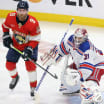The Carolina Hurricanes were eliminated from the Stanley Cup Playoffs by the New York Rangers with a 5-3 loss in Game 6 of the best-of-7 Eastern Conference Second Round at PNC Arena on Thursday.
The Hurricanes (52-23-7) qualified for the playoffs as the second-place team in the Metropolitan Division, three points behind the Rangers, who also won the Presidents’ Trophy.
Carolina has made the playoffs in six straight seasons, losing in the second round in three of the past four.
The skinny
Potential unrestricted free agents: Teuvo Teravainen, F; Jake Guentzel, F; Jordan Martinook, F; Stefan Noesen, F; Brady Skjei, D; Brett Pesce, D; Tony DeAngelo, D; Jalen Chatfield, D
Potential restricted free agents: Martin Necas, F; Jack Drury, F; Seth Jarvis, F; Ryan Suzuki, F; Max Comtois, F; Dylan Coghlan, D
Potential 2024 Draft picks: 9
Here are five reasons the Hurricanes were eliminated:
1. Nothing special
The margins in this series were razor thin. Five of the six games were decided by one goal (not counting the empty-net goal in Game 6) and the Rangers outscored the Hurricanes 20-19.
So production on special teams stood out like a sore thumb.
New York scored five power-play goals in 19 attempts during the series, including the winning goal in Game 2 and tying goal in Game 6. Carolina went 2-for-21 on the power play and allowed two short-handed goals.
That’s minus-5. The biggest difference in the series.
2. Goaltending
Frederik Andersen was outplayed by Igor Shesterkin in almost every game.
Forget the numbers, which we will get to in a minute.
It was the quality of the goals. Two stand out.
In Game 6, Andersen couldn’t get a glove on a puck at his skates against the post with the Hurricanes holding a lead. Rangers forward Chris Kreider poked it home as the dagger goal in a four-goal comeback.
In Game 4, Andersen lost his post and forward Alexis Lafrenière banked the tying goal off Andersen’s back and into the net. Carolina won 4-3 in overtime, but the goal was an ugly one.
For the series, Andersen had an .878 save percentage in five games (Pyotr Kochetkov played in Game 3), second-lowest among goalies who played more than one game in the second round.
Shesterkin, who faced 92 more shots than Andersen, had a .919 save percentage, best among goalies in the second round.
3. Inability to hold a lead
The Hurricanes had an in-game lead six times during the series; they squandered five of them. They won Game 4 after giving up a 2-1 lead in the third period and they won Game 5 going away with a dominant finishing kick.
But in every other game, they surrendered momentum with defensive-zone breakdowns. Carolina coughed up two two-goal leads in Game 4 and found a way to win. They weren’t as lucky in Game 6, letting two more two-goal leads evaporate in a crushing loss.
4. Lack of discipline
The Hurricanes struggled to find their discipline early in the series. They gave the Rangers nine power-play opportunities in the first two games and were punished by New York's lethal power play, which converted on four of them.
Carolina allowed 10 power plays the rest of the series, but the last one was telling; captain Jordan Staal cross-checked Rangers center Mika Zibanejad in the third period of Game 6. Kreider scored the second of his three straight goals on the ensuing man-advantage, tying the game 3-3.
5. Injuries
The Hurricanes stayed healthy throughout the series, but it was the players missing at the start that told the tale.
Defenseman Brett Pesce sustained a lower-body injury during Game 2 of the first round. Though Tony DeAngelo played well in his stead, there was no replacing the stability and veteran presence provided by Pesce.
Forward Jesper Fast sustained an upper-body injury during the final regular-season game and never returned. His speed and defensive acumen were missed.
Each was a key contributor to a penalty kill that went from dominance -- leading the NHL during the regular season (86.4 percent) -- to mediocrity during the postseason (73.3 percent, eighth among playoff teams).



















